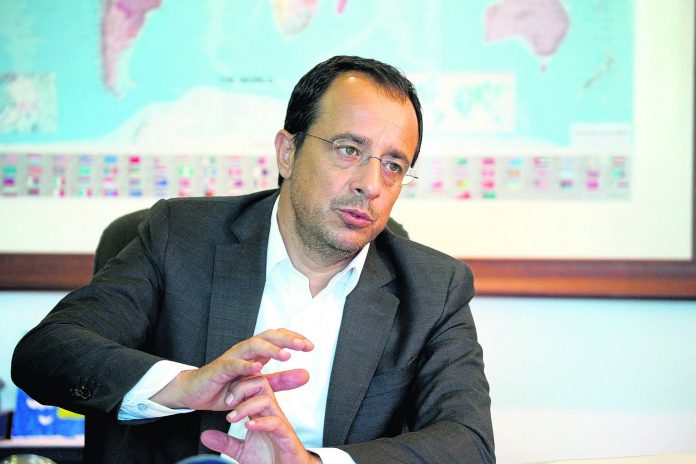
The European Union must do more to fill a power vacuum in the eastern Mediterranean brought on by a perceived U.S. disengagement from the region, and Cyprus is ready to host an EU task force to achieve that goal, the island nation’s foreign minister said Wednesday.
Nikos Christodoulides said the EU has so far failed to use its ample “soft power” to position itself as the leading player in a region fraught with problems such as terrorism and illegal immigration.
The Cypriot official said the EU should pursue a more muscular policy with a larger military footprint in the region, and lauded France for supporting this line. French President Emmanuel Macron is organizing a summit of the EU’s seven Mediterranean nations Sept 10 to discuss developments in the eastern Mediterranean.
“The EU should have in its toolbox of available means more hard power,” Christodoulides told the Associated Press in an interview.
Because of its close proximity to the Middle East, Christodoulides said EU-member Cyprus can act as a base of operations for the bloc’s humanitarian and other missions. Cyprus is 180 kilometers (120 miles) away from Lebanon and could serve as the EU’s hub for delivering assistance in the wake of Tuesday’s deadly blast in Beirut.
“The EU says that it’s interested in the region. But to show that interest it must show it in actions, not just words,” said Christodoulides. “We would welcome an EU task force in Cyprus for the region.”
Christodoulides said the Cypriot government is in negotiations with “several countries” with a “special interest” in the eastern Mediterranean to offer its facilities, but not as a launching pad for any offensive military action.
The Cypriot official said Turkey is taking full advantage of the power void to fulfill its ambition of attaining regional supremacy, in combination with a parallel goal of assuming the leadership of the Islamic world.
He cited as an example Turkey’s ongoing hydrocarbons search inside waters where Cyprus claims exclusive economic rights. Turkey is also militarily engaged in Libya, Syria and Iraq.
Turkey doesn’t recognize Cyprus — which is ethnically divided between Greek and Turkish Cypriots — as a state and claims 44% of its exclusive economic zone at its own. Since 1974, Turkey has occupied a third of the island after an invasion triggered by an abortive coup by Greek Cypriot supporters of union with Greece.
The EU has repeatedly condemned Turkey’s drilling activities in Cypriot waters and imposed some sanctions on the country while backing the Cypriot government’s invitation to Ankara to negotiate a maritime border deal. Christodoulides said Cyprus expects the EU to urge Turkey to sit down for talks.
“Some in Brussels are under the impression that the EU needs Turkey more than Turkey needs the EU. That’s a mistaken impression,” Christodoulides said.
The minister said there can be no military solution to heightened regional tensions. But Cyprus “should look seriously” at the possibility of building up a naval deterrent force as a way of rallying the international community to pressure Turkey to cease its provocations.
Christoulides said Turkey has an open invitation to join a web of evolving, energy-based partnerships Cyprus has forged with East Med countries including Israel, Egypt and Jordan — as long as Ankara respects international law.
He hailed strengthened ties with the U.S. enshrined in Congress-approved legislation, but noted this doesn’t necessarily mean the two countries see eye-to-eye on all issues.
The Eastern Mediterranean Security and Energy Partnership Act foresees a lifting of a decades-old U.S. arms embargo on Cyprus, on condition that the country no longer accepts Russian warships in its ports.
“There are issues on which you have different approaches and issues where you have disagreements,” said Christodoulides.
Cypriot President Nicos Anastasiades last week asked Russian counterpart Vladimir Putin to intercede with Turkey to help ease tensions over gas exploration.
“We want to solve our problems with Turkey and we have to recognize that right now President Putin is probably the international leader that has the best relations with (Turkish) President (Recep Tayyip) Erdogan,” Christodoulides said.



















